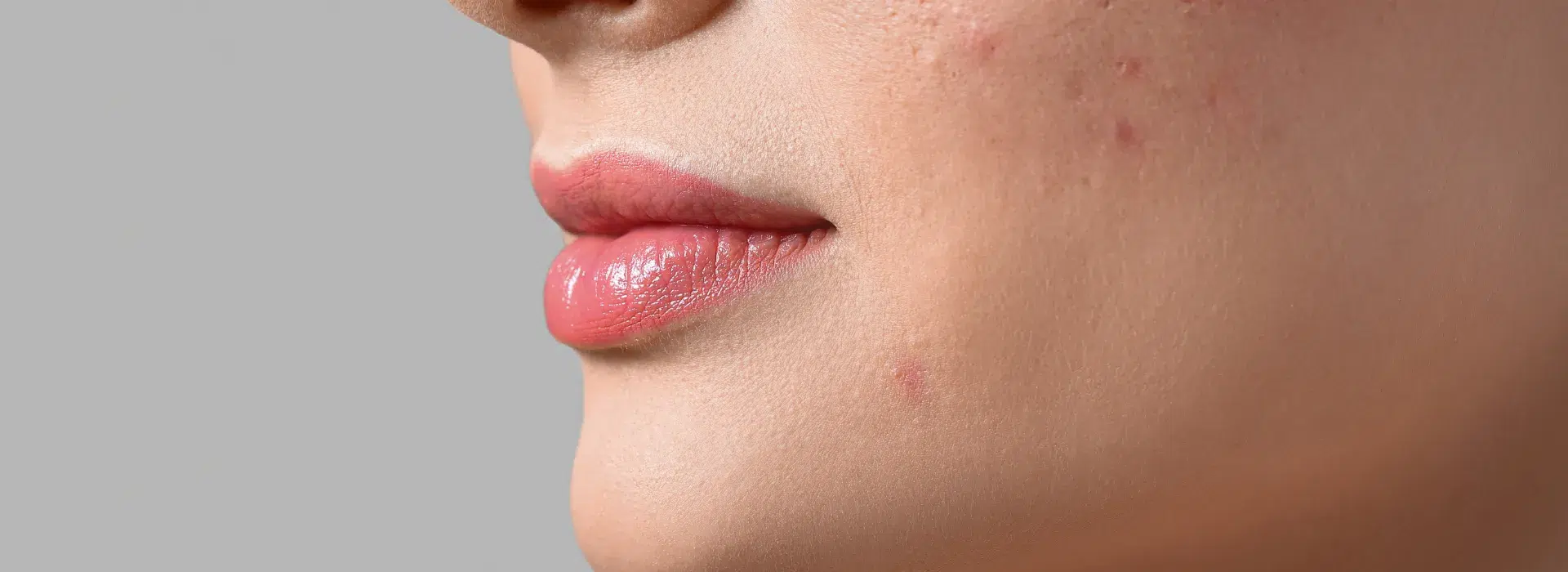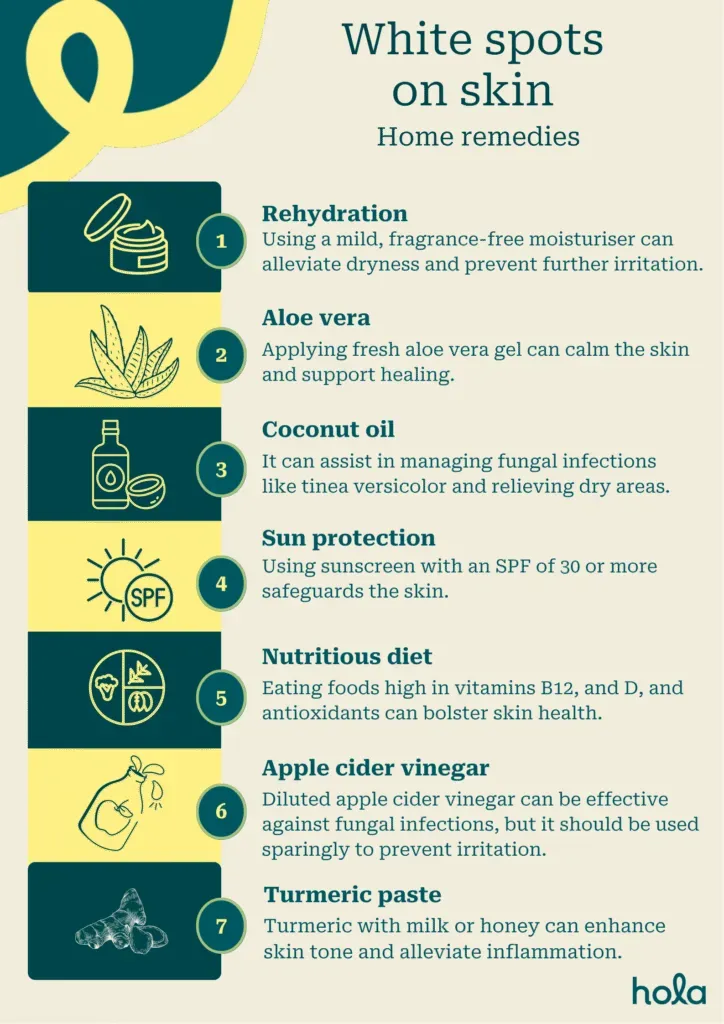White spots on skin: Possible causes and next steps
Written by the editorial staff writer at Hola. Medically Reviewed by Dr. Ammar AL-ANI, MBChB, CCBST, AMC. Blog updated on 12 November, 2025. Originally published on 15 May, 2025.

Contents

Overview
White patches on the skin can emerge unexpectedly and cause anxiety, particularly when they persist. While most cases are harmless, some may suggest underlying conditions such as fungal infections, vitiligo, or nutritional deficits. It's important to know the causes of these patches, how to recognise them, and when to seek medical advice for appropriate treatment and peace of mind.Common causes
White patches on the skin can stem from a variety of factors. Identifying the cause can help you select the appropriate treatment and avoid further spread. Let’s explore some typical causes and their usual appearances:- Vitiligo: This autoimmune disorder occurs when pigment-producing cells are destroyed, resulting in smooth white patches that may gradually expand.
- Pityriasis alba: Generally observed in children or young adults, this condition results in dry, scaly, and light-colored patches on the face, arms, or neck.
- Tinea versicolor: A fungal infection that alters skin pigmentation, leading to small white, brown, or pink patches, often found on the chest, shoulders, or back.
- Idiopathic guttate hypomelanosis: Small, circular white spots that develop after years of sun exposure, predominantly seen in older adults.
- Lichen sclerosus: A chronic condition that causes thin, wrinkled, white patches, mainly in the genital area but can also affect other skin areas.
- Post-inflammatory hypopigmentation: This occurs when the skin loses colour following inflammation or injury from conditions such as eczema or psoriasis.
- Nutritional deficiencies: Insufficient levels of vitamin B12, vitamin D, or calcium can sometimes lead to pigment loss or pale patches.
- Sun damage: Extended exposure to UV rays can harm pigment cells, resulting in lighter patches, particularly in those with fair skin.
Other causes
Though uncommon, certain medical or environmental factors may also result in white patches:- Nevus depigmentosus: A benign birthmark with reduced pigmentation that remains stable over time.
- Chemical leukoderma: Resulting from contact with chemicals found in dyes, detergents, or rubber products.
- Leprosy: A bacterial infection impacting the skin and nerves, which can occasionally lead to paler patches with loss of sensation.
- Sarcoidosis: An inflammatory ailment that can affect the skin, lungs, or other organs, sometimes resulting in white lesions.
- Autoimmune diseases: Conditions like lupus or scleroderma may cause uneven pigment loss.
- Genetic disorders: Rare inherited conditions, such as tuberous sclerosis or piebaldism, can result in white areas on the skin.
Feeling sick and unsure why? Speak with a GP online in 15 minutes.
See a Doctor now
Available 24/7, across Australia.
Type of white spots
While a doctor can provide a conclusive diagnosis, observing a few essential characteristics may help you understand what could be happening:- Texture: Vitiligo and sun-related spots appear smooth, whereas fungal infections might feel somewhat scaly.
- Location: Pityriasis alba often appears on the face, while tinea versicolor is commonly found on the back and chest.
- Onset: Fungal and inflammatory causes usually appear suddenly, unlike autoimmune or sun-related causes, which develop over time.
- Sensation: If a patch is itchy or exhibits decreased sensation, it may indicate an infection or a nerve-related issue.
Home treatment
 Home remedies can be beneficial for mild cases, but seeking medical advice is always advisable before initiating any new treatment. Here are several gentle methods to care for your skin and assist in healing at home:
Home remedies can be beneficial for mild cases, but seeking medical advice is always advisable before initiating any new treatment. Here are several gentle methods to care for your skin and assist in healing at home:
- Stay hydrated and moisturised: Use a gentle, fragrance-free moisturiser daily to alleviate dryness and flaking.
- Utilise aloe vera: Fresh aloe vera gel calms irritation and encourages skin healing.
- Consider coconut oil: It has natural antifungal and hydrating qualities that may aid in treating infections such as tinea versicolor.
- Shield from the sun: Apply sunscreen (SPF 30 or higher) daily to avert additional pigmentation damage.
- Consume a nutrient-rich diet: Include foods rich in vitamins B12, D, and antioxidants to improve skin health.
- Apple cider vinegar: A diluted mixture can assist with mild fungal infections, but should be used in moderation.
- Turmeric paste: Mixing turmeric with milk or honey can reduce inflammation and promote a more even skin tone.
When to see a doctor
You should consult a doctor if your white spots are:- Expanding or spreading quickly.
- Associated with itching, pain, or changes in texture.
- Sudden in appearance without an obvious cause.
- Persisting despite home treatment.
- Connected to fatigue, numbness, or any other health issues.
- If you have a family history of autoimmune or skin conditions, or if the patches impact your confidence or quality of life, a consultation can offer clarity and reassurance.
How Hola Health can help
At Hola Health, you can connect with a qualified doctor online, anytime and from anywhere. Whether your white spots stem from vitiligo, fungal infections, or nutrient deficiencies, our GPs can assist with diagnosis and treatment. Hola Health provides:- Online GP consultations: Speak with an Australian doctor in just minutes.
- Prescriptions and referrals: Obtain antifungal creams, supplements, or referrals to dermatologists without delay.
- Medical certificates: Get doctor’s notes for rest or recovery if needed.
Conculsion
Most white spots on the skin are non-threatening and manageable with appropriate care. Whether attributed to a fungal infection, a vitamin deficiency, or an autoimmune issue, early diagnosis simplifies management. Protect your skin from sun damage, maintain a nutritious diet, and don’t hesitate to consult a doctor if you observe persistent or spreading patches.FAQ
What deficiency leads to white spots on the skin?
Deficiencies in vitamin B12, vitamin D, calcium, and zinc can result in reduced pigmentation or light patches on the skin.Are white spots on the skin cancerous?
Most are not cancerous. Common causes such as vitiligo or fungal infections are harmless, but a doctor should evaluate any spot that alters in size, shape, or texture.Can stress lead to white spots on the skin?
Chronic stress may weaken your immune system, potentially triggering or exacerbating conditions like vitiligo or eczema that affect pigmentation.Should I consult a dermatologist or GP for white patches?
Begin with a GP consultation. They can evaluate your symptoms, request blood tests, and refer you to a dermatologist if necessary.Can low iron result in white spots?
Low iron typically causes the skin to appear pale rather than patchy. However, severe anaemia can contribute to general discolouration.What autoimmune diseases cause white spots?
Vitiligo is the most prevalent autoimmune cause, but lupus and scleroderma can also lead to pigment loss in specific areas.Can white spots go away on their own?
Some white patches may naturally fade once the underlying issue is resolved, for instance, pityriasis alba or mild post-inflammatory marks. However, conditions like vitiligo, lichen sclerosus, or sun-related damage typically require ongoing management. Fungal infections generally resolve with treatment but can recur if not adequately addressed. If the patches remain, spread, or alter in appearance, seeking medical advice is recommended. Get your prescription online within
15 minutes, anytime, anywhere.
15 minutes, anytime, anywhere.
Request an instant script
Available 24/7, across Australia.
What we treat
- Cough
- Nausea & vomiting
- Fever
- Hayfever
- Fatigue
- Sore throat
- Acne
- Hair loss
- Gout
- Eczema
- Rosacea
- Sunburn
- UTI
- Erectile dysfunction
- Contraception
- Morning sickness
- Morning after pill
- Prostate health
- Anxiety
- Depression
- Stress
- Grief & loss
- Antidepressants
- Premature ejaculation
- Asthma
- Blood pressure
- Blood thinners
- Diabetes
- Cholesterol
- Migraines & headaches
- Allergies
- Body ache
- Heartburn & reflux
- Sleep disorder
- Pain relief
- Gastro
Related Articles
Disclaimer
This blog is for general informational purposes only and does not indicate that Hola Health provides all treatments or preventive measures mentioned. It is not intended to be a substitute for professional medical advice. Always seek the guidance of your doctor or other qualified health professional with any questions you may have regarding your health or a medical condition. For emergencies please immediately contact 000. Any medical topics discussed are intended to educate, not to imply availability through Hola Health.
 Facebook
Facebook  X
X  Copy Link
Copy Link



